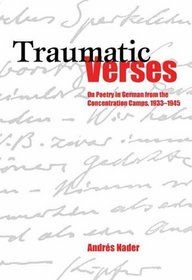Auschwitz, Buchenwald, Christianstadt, Dachau. The names of Nazi concentration camps evoke images of radical destitution. The atrocities we call the Holocaust defy comprehension, while thinkers continue to ponder the possibility of "poetry after Auschwitz." And yet a number of people composed poems while imprisoned in the camps. Unlike most documents about the camps, these poems are self-representations that convey the perspective of the inmates who wrote them. Traumatic Verses provides psychoanalytically informed close readings of a range of poems and discusses their significance for aesthetic theory and for research on the camps. It also tells the stories behind the composition and preservation of these poems and the history of their publication since 1945. Most of the poems appear here for the first time in English translation along with the original texts. This book fills a gap left by literary historians, who have mostly ignored writings from the camps and avoided careful scrutiny of literature produced under the Nazi regime. Studies of trauma have concentrated on post-traumatic experiences; discussions of aesthetics after the Holocaust have neglected the issue of the artistic impulse in the camps. On both counts this book constitutes a unique contribution to scholarship, showing that, when read attentively, the poems written in the camps are invaluable sites for confronting the Nazi past.
Andrés J. Nader lectures at Humboldt University in Berlin.
